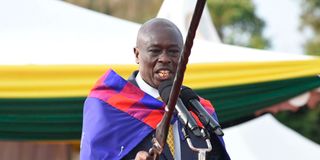The overlooked storyteller: Of Gachagua, Kenyan politics and Simple Narratives

Deputy President Rigathi Gachagua during a fundraiser in aid of women groups and boda-boda groups in Iten, Elgeyo Marakwet County in this past photo.
Deputy President Rigathi Gachagua is austere, and sometimes menacing and angry, exuding a smugness some find vaguely stifling.
He probably knows that behind the façade of the perfect handshakes and polite smiles of Kenyan politicians lurks something darker, riskier.
He doesn’t bring a knife to a gunfight — he brings a heavy machine gun and lobs grenades generously. He embodies the philosophy of famous Hungarian-American businessman, Andy Grove, once CEO of Intel Corporation: “only the paranoid survive”.
He says, in his own words, that he speaks as a “truthful men (sic)” with no ironic hint, nuance or wit but directly — sometimes in almost a coarse and crude way — relishing the heady atmosphere of political victory.
Like incomprehensibly opaque lines of poetry that are difficult to understand — feverish, ominous and with the speed of chattering teeth — his words sometimes ricochet in angry outbursts against the opposition.
If he were a boxer, he’d be one always winding himself into a defensive pose, fist at the ready. Critics aver that the deputy president is reckless, with a dangerous flirtation with power that threatens to send the country into a tailspin.
If it were up to him, he would probably grab opposition politicians by the scruffs of their necks and drag them into the Indian ocean!
However, he is a hardened political operator who understands the power of simple narratives. In literature, a narrative is “a spoken or written account of connected events”.
It’s simply a story. During the campaigns in 2022, Mr Gachagua had promised residents that they would eat rice and meat (mchele nyama) at the Sagana State Lodge. The elite laughed it off as a big joke. It was the subject of hilarious social media memes.
“Who would be interested in food at Sagana State Lodge?” intellectuals queried. However, on Sunday August 6, Mr Gachagua delivered on his rice and meat pledge. And residents showed up. The internet beamed photos of residents who tumbled into the Sagana State Lodge, loading their plates with piles of rice and meat. People spilt onto the grounds talking as they ate.
They formed clusters that fell apart and came together again in continually changing configurations as they toured the compound, exhaling plumes of mist in the damp, cold air.
Amidst the potted plants, teal glazed tiles and art deco fittings of the Sagana State Lodge, the people eating most likely did so in a hurry, like all people with a sense of transience do, reminding themselves that they won’t stay long; knowing that they would soon be on their way to somewhere else. This may be dismissed as seeking cheap popularity but such stunts have political mileage in Kenya, fair or not.
And Mr Gachagua is a storyteller of a different kind — a master of political narratives. Apart from the “rice and meat” promise, he recently confessed that he deliberately fooled his political foes by pretending not to be fluent.
Before the deputy presidential debate in 2022, Mr Gachagua had lowered expectations so much that people expected Ms Martha Karua (then Mr Raila Odinga’s running mate) to easily triumph. However, Mr Gachagua held his ground, exceeding expectations and probably winning the debate.
During that deputy presidential debate on July 19, 2022, Mr Gachagua stuck to some of the qualities of a good narrative.
The first of these qualities is to begin with a strong lead, jumping into the action with the setting to create a certain mood. In his opening lines for the debate, he memorably said, “Tonight is a defining moment for the people of Kenya. The people of Kenya are in anguish. They are in a state of helplessness. They have no food. They don’t know where to get their next meal. They are devastated. They need hope. Tonight, I will present the Kenya Kwanza Plan on how we intend to turn around the economy of this country, put people where they belong, restore their dignity, put money in their pockets and allow them to enjoy their dignity”.
That was a devastating opening for a gripping narrative: the people of Kenya were hopeless, they needed hope.
The other quality of a good narrative is a strong ending. After painting the picture of a helpless Kenyan people, he made a case that then President Uhuru Kenyatta was responsible for impoverishing Kenyans and taking away their dignity.
Then he tied Ms Martha Karua to President Uhuru and chained them to Odinga and torched the trio in a burning inferno. The narrative he stuck to was simple: President Uhuru Kenyatta (and by extension Mr Odinga) were bad for the country.
And he said that over and over. This was probably unfair, and Mr Gachagua used a propaganda technique, ad nauseam (constant repetition), as he echoed the “Uhuru and Raila are bad” dynasty narrative many times during the debate and after, but as a storyteller and politician, he delivered.
Now that Mr Gachagua and President Ruto are in power, they should know that Kenyans remember all the narratives they creatively told. Now is the time to deliver. No more narratives.
- The writer is a book publisher based in Nairobi. [email protected].





